Tourism Planning Environments: UNTWO Tourism for Sustainable Development and National Heritage Tourism Summit Discussion Papers
VerifiedAdded on 2022/10/02
|8
|1828
|128
AI Summary
This article discusses two important discussion papers on tourism planning environments: UNTWO Tourism for Sustainable Development 2017 and National Heritage Tourism Summit. The UNTWO paper focuses on sustainable tourism development, while the National Heritage Tourism Summit paper is in regards to the effective development of heritage tourism in Australia. Both papers provide systematic discussions and analysis of tourism related aspects, including stakeholders, policy planning cycles, and effective policy implementation for sustainable tourism and heritage tourism development.
Contribute Materials
Your contribution can guide someone’s learning journey. Share your
documents today.
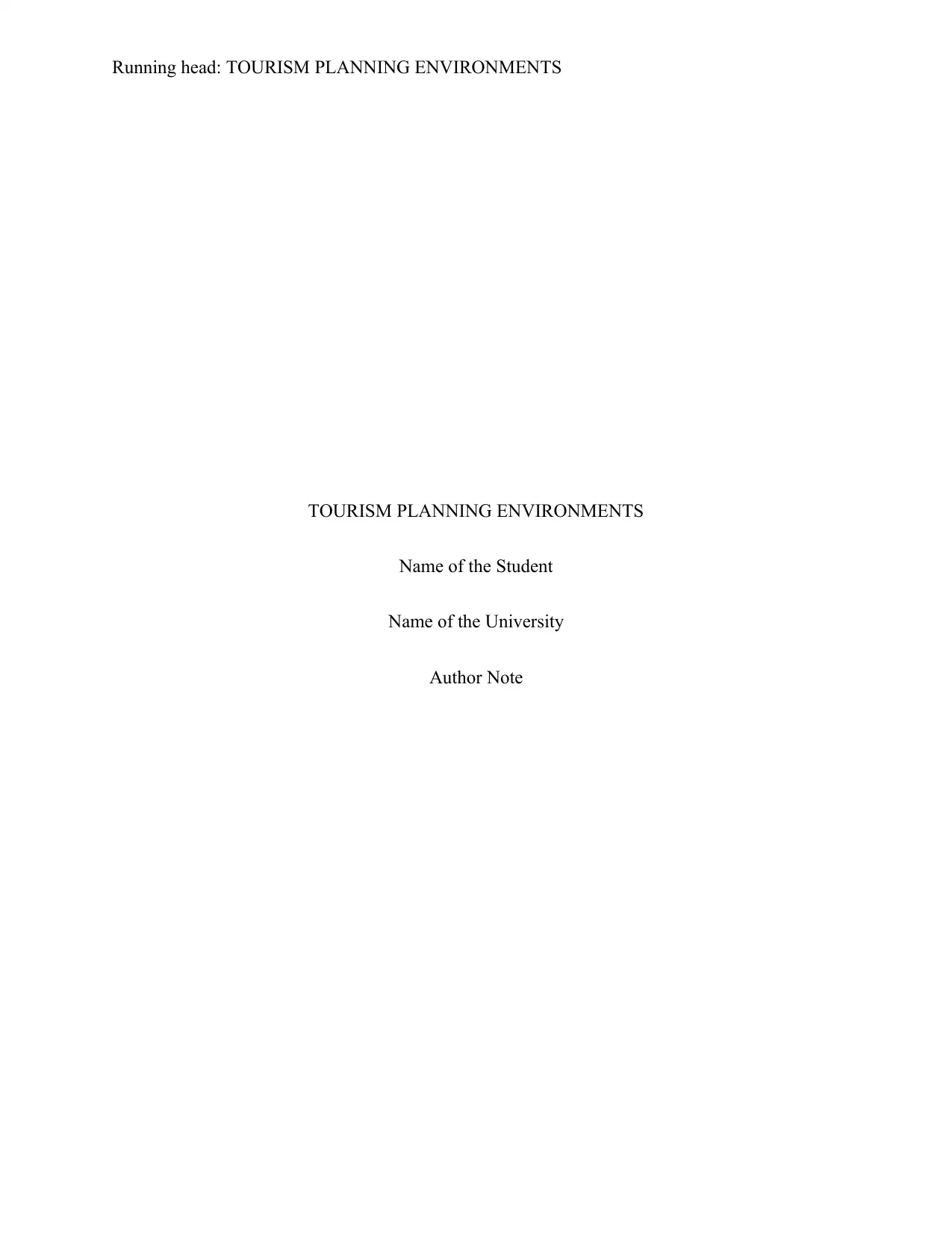
Running head: TOURISM PLANNING ENVIRONMENTS
TOURISM PLANNING ENVIRONMENTS
Name of the Student
Name of the University
Author Note
TOURISM PLANNING ENVIRONMENTS
Name of the Student
Name of the University
Author Note
Secure Best Marks with AI Grader
Need help grading? Try our AI Grader for instant feedback on your assignments.
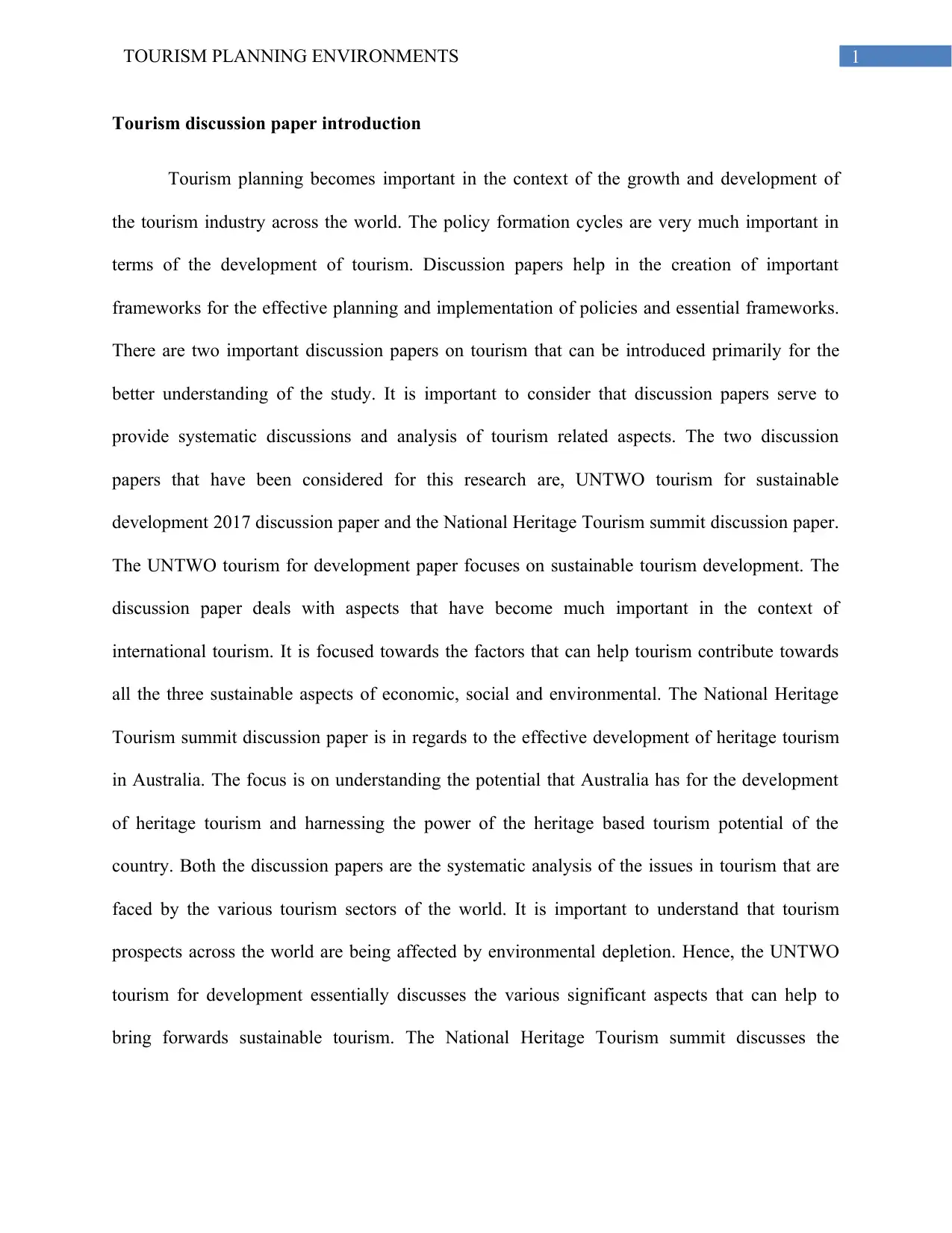
1TOURISM PLANNING ENVIRONMENTS
Tourism discussion paper introduction
Tourism planning becomes important in the context of the growth and development of
the tourism industry across the world. The policy formation cycles are very much important in
terms of the development of tourism. Discussion papers help in the creation of important
frameworks for the effective planning and implementation of policies and essential frameworks.
There are two important discussion papers on tourism that can be introduced primarily for the
better understanding of the study. It is important to consider that discussion papers serve to
provide systematic discussions and analysis of tourism related aspects. The two discussion
papers that have been considered for this research are, UNTWO tourism for sustainable
development 2017 discussion paper and the National Heritage Tourism summit discussion paper.
The UNTWO tourism for development paper focuses on sustainable tourism development. The
discussion paper deals with aspects that have become much important in the context of
international tourism. It is focused towards the factors that can help tourism contribute towards
all the three sustainable aspects of economic, social and environmental. The National Heritage
Tourism summit discussion paper is in regards to the effective development of heritage tourism
in Australia. The focus is on understanding the potential that Australia has for the development
of heritage tourism and harnessing the power of the heritage based tourism potential of the
country. Both the discussion papers are the systematic analysis of the issues in tourism that are
faced by the various tourism sectors of the world. It is important to understand that tourism
prospects across the world are being affected by environmental depletion. Hence, the UNTWO
tourism for development essentially discusses the various significant aspects that can help to
bring forwards sustainable tourism. The National Heritage Tourism summit discusses the
Tourism discussion paper introduction
Tourism planning becomes important in the context of the growth and development of
the tourism industry across the world. The policy formation cycles are very much important in
terms of the development of tourism. Discussion papers help in the creation of important
frameworks for the effective planning and implementation of policies and essential frameworks.
There are two important discussion papers on tourism that can be introduced primarily for the
better understanding of the study. It is important to consider that discussion papers serve to
provide systematic discussions and analysis of tourism related aspects. The two discussion
papers that have been considered for this research are, UNTWO tourism for sustainable
development 2017 discussion paper and the National Heritage Tourism summit discussion paper.
The UNTWO tourism for development paper focuses on sustainable tourism development. The
discussion paper deals with aspects that have become much important in the context of
international tourism. It is focused towards the factors that can help tourism contribute towards
all the three sustainable aspects of economic, social and environmental. The National Heritage
Tourism summit discussion paper is in regards to the effective development of heritage tourism
in Australia. The focus is on understanding the potential that Australia has for the development
of heritage tourism and harnessing the power of the heritage based tourism potential of the
country. Both the discussion papers are the systematic analysis of the issues in tourism that are
faced by the various tourism sectors of the world. It is important to understand that tourism
prospects across the world are being affected by environmental depletion. Hence, the UNTWO
tourism for development essentially discusses the various significant aspects that can help to
bring forwards sustainable tourism. The National Heritage Tourism summit discusses the
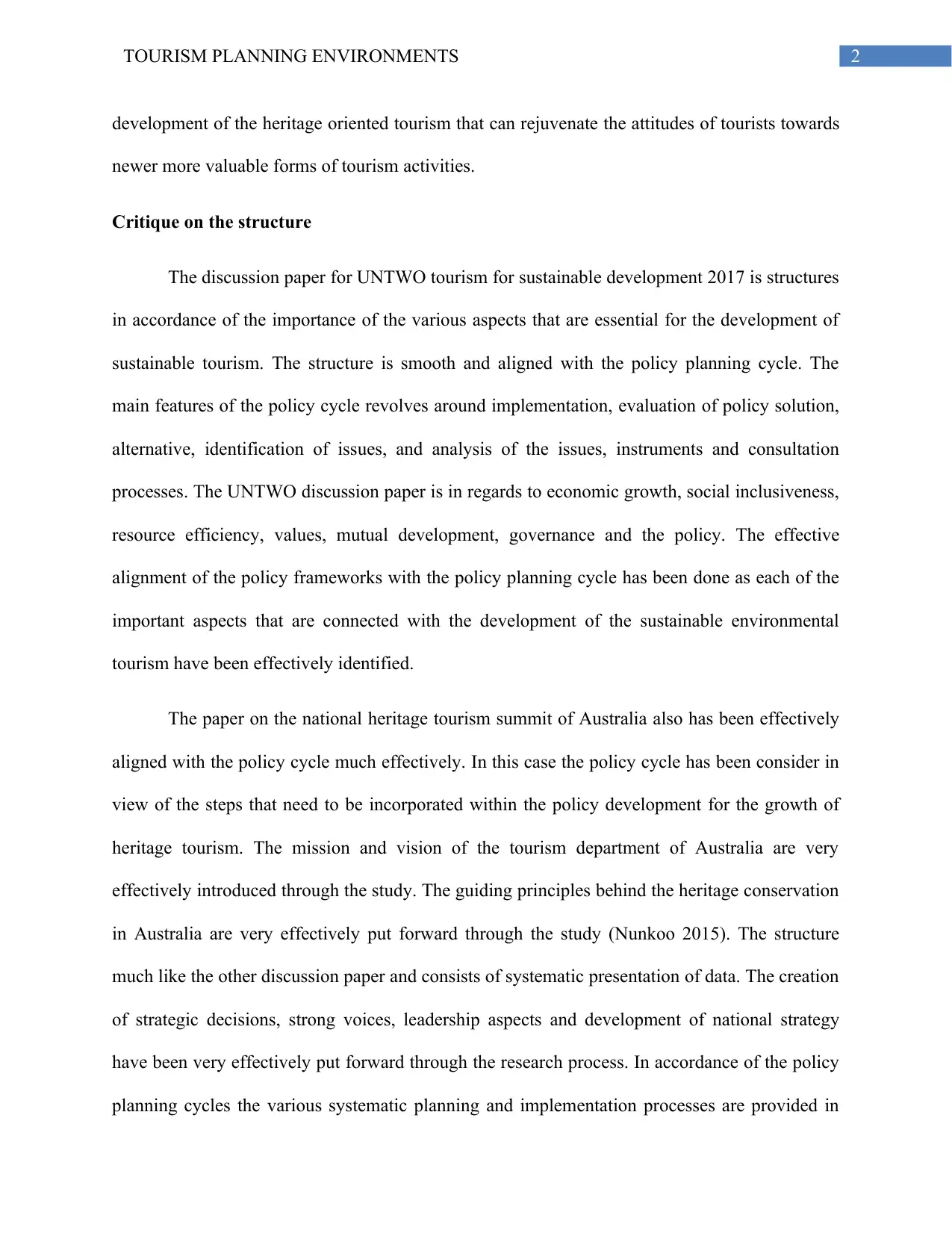
2TOURISM PLANNING ENVIRONMENTS
development of the heritage oriented tourism that can rejuvenate the attitudes of tourists towards
newer more valuable forms of tourism activities.
Critique on the structure
The discussion paper for UNTWO tourism for sustainable development 2017 is structures
in accordance of the importance of the various aspects that are essential for the development of
sustainable tourism. The structure is smooth and aligned with the policy planning cycle. The
main features of the policy cycle revolves around implementation, evaluation of policy solution,
alternative, identification of issues, and analysis of the issues, instruments and consultation
processes. The UNTWO discussion paper is in regards to economic growth, social inclusiveness,
resource efficiency, values, mutual development, governance and the policy. The effective
alignment of the policy frameworks with the policy planning cycle has been done as each of the
important aspects that are connected with the development of the sustainable environmental
tourism have been effectively identified.
The paper on the national heritage tourism summit of Australia also has been effectively
aligned with the policy cycle much effectively. In this case the policy cycle has been consider in
view of the steps that need to be incorporated within the policy development for the growth of
heritage tourism. The mission and vision of the tourism department of Australia are very
effectively introduced through the study. The guiding principles behind the heritage conservation
in Australia are very effectively put forward through the study (Nunkoo 2015). The structure
much like the other discussion paper and consists of systematic presentation of data. The creation
of strategic decisions, strong voices, leadership aspects and development of national strategy
have been very effectively put forward through the research process. In accordance of the policy
planning cycles the various systematic planning and implementation processes are provided in
development of the heritage oriented tourism that can rejuvenate the attitudes of tourists towards
newer more valuable forms of tourism activities.
Critique on the structure
The discussion paper for UNTWO tourism for sustainable development 2017 is structures
in accordance of the importance of the various aspects that are essential for the development of
sustainable tourism. The structure is smooth and aligned with the policy planning cycle. The
main features of the policy cycle revolves around implementation, evaluation of policy solution,
alternative, identification of issues, and analysis of the issues, instruments and consultation
processes. The UNTWO discussion paper is in regards to economic growth, social inclusiveness,
resource efficiency, values, mutual development, governance and the policy. The effective
alignment of the policy frameworks with the policy planning cycle has been done as each of the
important aspects that are connected with the development of the sustainable environmental
tourism have been effectively identified.
The paper on the national heritage tourism summit of Australia also has been effectively
aligned with the policy cycle much effectively. In this case the policy cycle has been consider in
view of the steps that need to be incorporated within the policy development for the growth of
heritage tourism. The mission and vision of the tourism department of Australia are very
effectively introduced through the study. The guiding principles behind the heritage conservation
in Australia are very effectively put forward through the study (Nunkoo 2015). The structure
much like the other discussion paper and consists of systematic presentation of data. The creation
of strategic decisions, strong voices, leadership aspects and development of national strategy
have been very effectively put forward through the research process. In accordance of the policy
planning cycles the various systematic planning and implementation processes are provided in
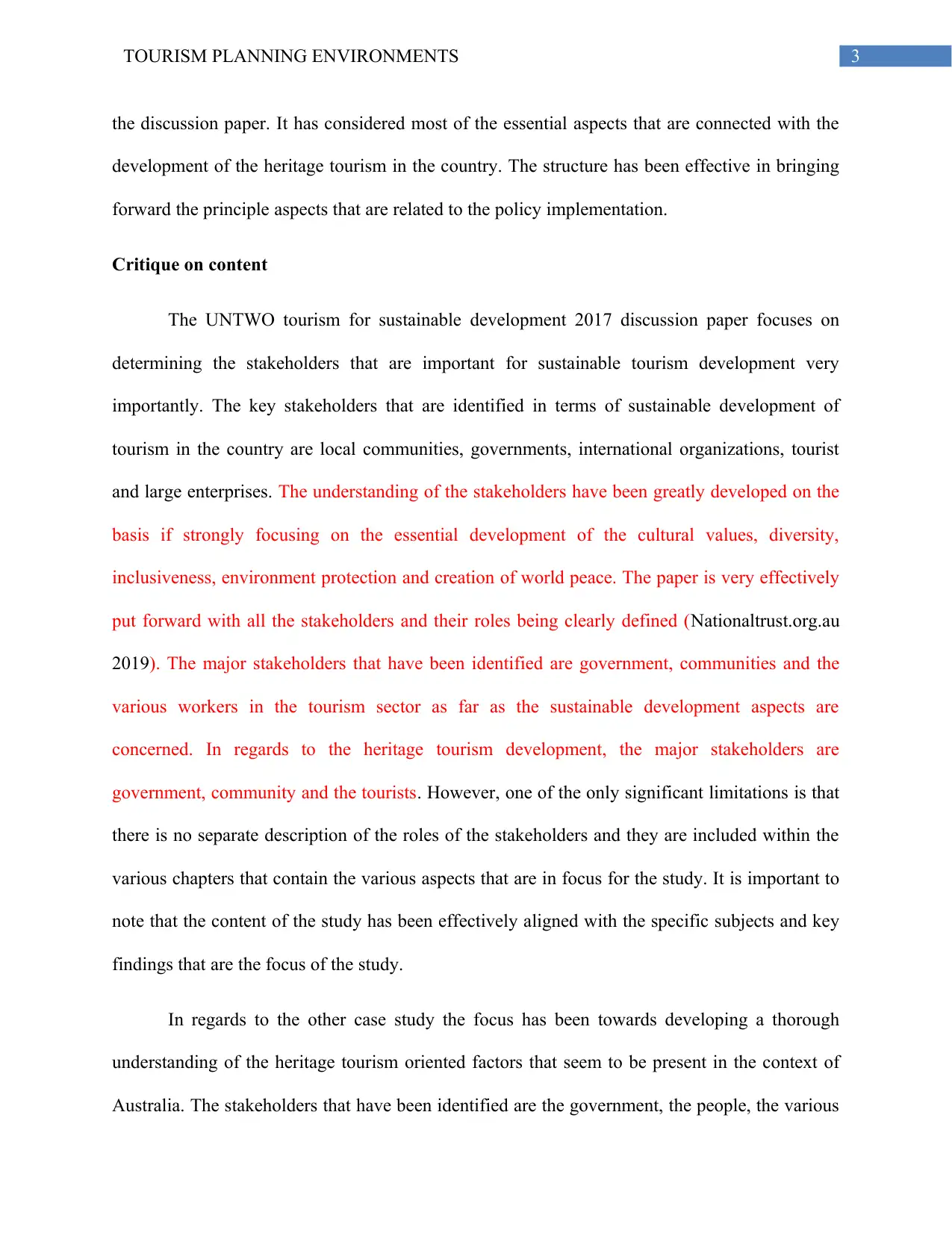
3TOURISM PLANNING ENVIRONMENTS
the discussion paper. It has considered most of the essential aspects that are connected with the
development of the heritage tourism in the country. The structure has been effective in bringing
forward the principle aspects that are related to the policy implementation.
Critique on content
The UNTWO tourism for sustainable development 2017 discussion paper focuses on
determining the stakeholders that are important for sustainable tourism development very
importantly. The key stakeholders that are identified in terms of sustainable development of
tourism in the country are local communities, governments, international organizations, tourist
and large enterprises. The understanding of the stakeholders have been greatly developed on the
basis if strongly focusing on the essential development of the cultural values, diversity,
inclusiveness, environment protection and creation of world peace. The paper is very effectively
put forward with all the stakeholders and their roles being clearly defined (Nationaltrust.org.au
2019). The major stakeholders that have been identified are government, communities and the
various workers in the tourism sector as far as the sustainable development aspects are
concerned. In regards to the heritage tourism development, the major stakeholders are
government, community and the tourists. However, one of the only significant limitations is that
there is no separate description of the roles of the stakeholders and they are included within the
various chapters that contain the various aspects that are in focus for the study. It is important to
note that the content of the study has been effectively aligned with the specific subjects and key
findings that are the focus of the study.
In regards to the other case study the focus has been towards developing a thorough
understanding of the heritage tourism oriented factors that seem to be present in the context of
Australia. The stakeholders that have been identified are the government, the people, the various
the discussion paper. It has considered most of the essential aspects that are connected with the
development of the heritage tourism in the country. The structure has been effective in bringing
forward the principle aspects that are related to the policy implementation.
Critique on content
The UNTWO tourism for sustainable development 2017 discussion paper focuses on
determining the stakeholders that are important for sustainable tourism development very
importantly. The key stakeholders that are identified in terms of sustainable development of
tourism in the country are local communities, governments, international organizations, tourist
and large enterprises. The understanding of the stakeholders have been greatly developed on the
basis if strongly focusing on the essential development of the cultural values, diversity,
inclusiveness, environment protection and creation of world peace. The paper is very effectively
put forward with all the stakeholders and their roles being clearly defined (Nationaltrust.org.au
2019). The major stakeholders that have been identified are government, communities and the
various workers in the tourism sector as far as the sustainable development aspects are
concerned. In regards to the heritage tourism development, the major stakeholders are
government, community and the tourists. However, one of the only significant limitations is that
there is no separate description of the roles of the stakeholders and they are included within the
various chapters that contain the various aspects that are in focus for the study. It is important to
note that the content of the study has been effectively aligned with the specific subjects and key
findings that are the focus of the study.
In regards to the other case study the focus has been towards developing a thorough
understanding of the heritage tourism oriented factors that seem to be present in the context of
Australia. The stakeholders that have been identified are the government, the people, the various
Secure Best Marks with AI Grader
Need help grading? Try our AI Grader for instant feedback on your assignments.
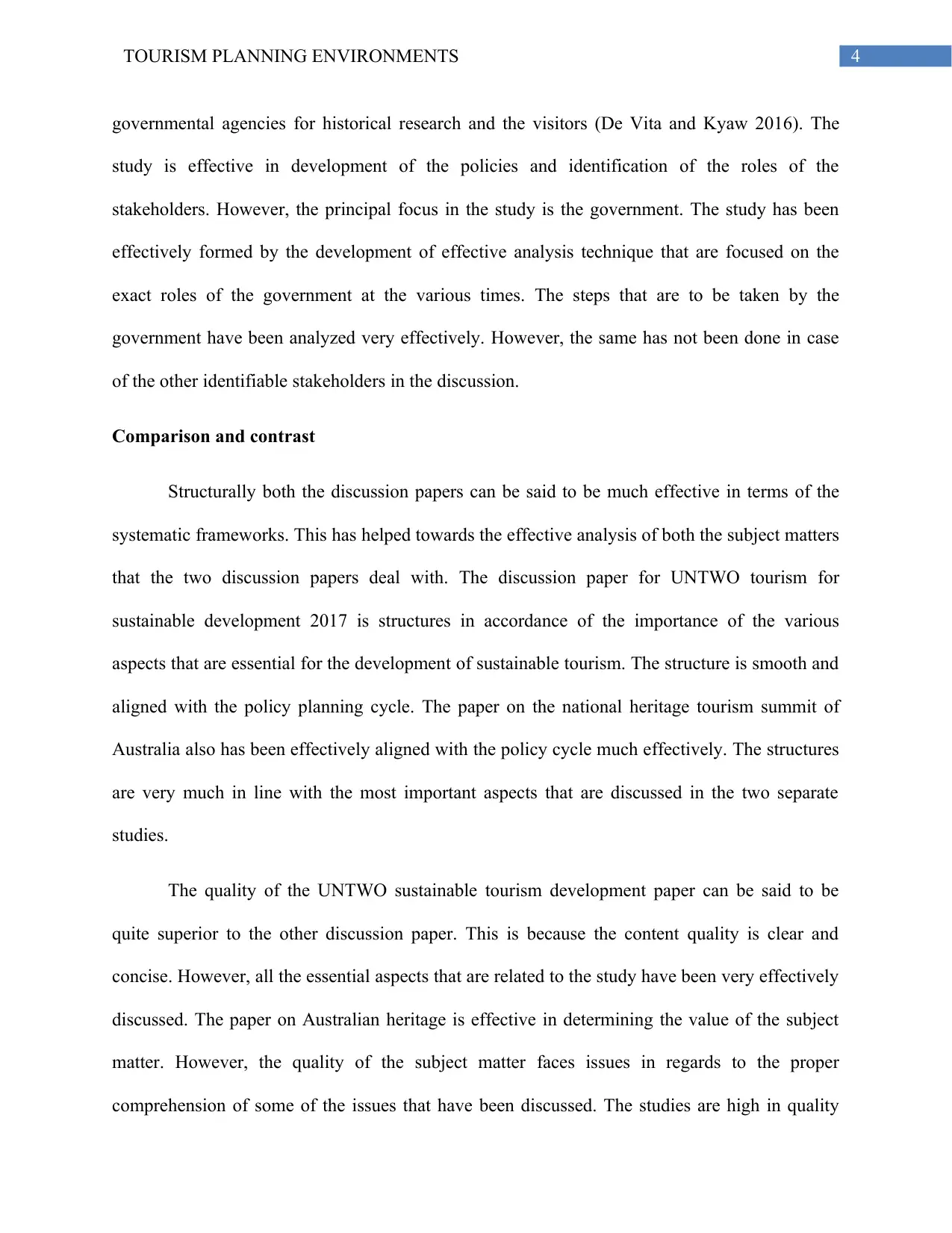
4TOURISM PLANNING ENVIRONMENTS
governmental agencies for historical research and the visitors (De Vita and Kyaw 2016). The
study is effective in development of the policies and identification of the roles of the
stakeholders. However, the principal focus in the study is the government. The study has been
effectively formed by the development of effective analysis technique that are focused on the
exact roles of the government at the various times. The steps that are to be taken by the
government have been analyzed very effectively. However, the same has not been done in case
of the other identifiable stakeholders in the discussion.
Comparison and contrast
Structurally both the discussion papers can be said to be much effective in terms of the
systematic frameworks. This has helped towards the effective analysis of both the subject matters
that the two discussion papers deal with. The discussion paper for UNTWO tourism for
sustainable development 2017 is structures in accordance of the importance of the various
aspects that are essential for the development of sustainable tourism. The structure is smooth and
aligned with the policy planning cycle. The paper on the national heritage tourism summit of
Australia also has been effectively aligned with the policy cycle much effectively. The structures
are very much in line with the most important aspects that are discussed in the two separate
studies.
The quality of the UNTWO sustainable tourism development paper can be said to be
quite superior to the other discussion paper. This is because the content quality is clear and
concise. However, all the essential aspects that are related to the study have been very effectively
discussed. The paper on Australian heritage is effective in determining the value of the subject
matter. However, the quality of the subject matter faces issues in regards to the proper
comprehension of some of the issues that have been discussed. The studies are high in quality
governmental agencies for historical research and the visitors (De Vita and Kyaw 2016). The
study is effective in development of the policies and identification of the roles of the
stakeholders. However, the principal focus in the study is the government. The study has been
effectively formed by the development of effective analysis technique that are focused on the
exact roles of the government at the various times. The steps that are to be taken by the
government have been analyzed very effectively. However, the same has not been done in case
of the other identifiable stakeholders in the discussion.
Comparison and contrast
Structurally both the discussion papers can be said to be much effective in terms of the
systematic frameworks. This has helped towards the effective analysis of both the subject matters
that the two discussion papers deal with. The discussion paper for UNTWO tourism for
sustainable development 2017 is structures in accordance of the importance of the various
aspects that are essential for the development of sustainable tourism. The structure is smooth and
aligned with the policy planning cycle. The paper on the national heritage tourism summit of
Australia also has been effectively aligned with the policy cycle much effectively. The structures
are very much in line with the most important aspects that are discussed in the two separate
studies.
The quality of the UNTWO sustainable tourism development paper can be said to be
quite superior to the other discussion paper. This is because the content quality is clear and
concise. However, all the essential aspects that are related to the study have been very effectively
discussed. The paper on Australian heritage is effective in determining the value of the subject
matter. However, the quality of the subject matter faces issues in regards to the proper
comprehension of some of the issues that have been discussed. The studies are high in quality
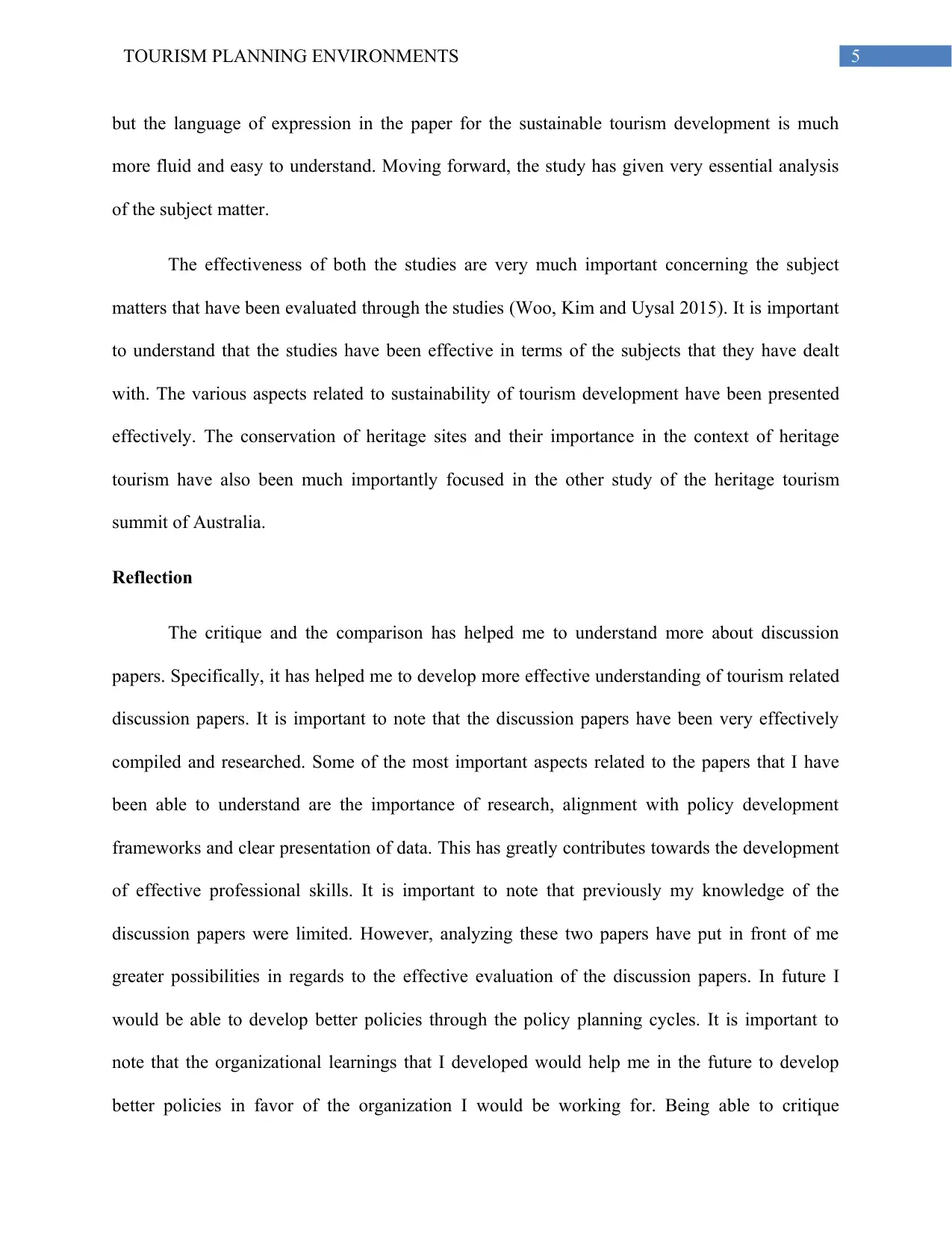
5TOURISM PLANNING ENVIRONMENTS
but the language of expression in the paper for the sustainable tourism development is much
more fluid and easy to understand. Moving forward, the study has given very essential analysis
of the subject matter.
The effectiveness of both the studies are very much important concerning the subject
matters that have been evaluated through the studies (Woo, Kim and Uysal 2015). It is important
to understand that the studies have been effective in terms of the subjects that they have dealt
with. The various aspects related to sustainability of tourism development have been presented
effectively. The conservation of heritage sites and their importance in the context of heritage
tourism have also been much importantly focused in the other study of the heritage tourism
summit of Australia.
Reflection
The critique and the comparison has helped me to understand more about discussion
papers. Specifically, it has helped me to develop more effective understanding of tourism related
discussion papers. It is important to note that the discussion papers have been very effectively
compiled and researched. Some of the most important aspects related to the papers that I have
been able to understand are the importance of research, alignment with policy development
frameworks and clear presentation of data. This has greatly contributes towards the development
of effective professional skills. It is important to note that previously my knowledge of the
discussion papers were limited. However, analyzing these two papers have put in front of me
greater possibilities in regards to the effective evaluation of the discussion papers. In future I
would be able to develop better policies through the policy planning cycles. It is important to
note that the organizational learnings that I developed would help me in the future to develop
better policies in favor of the organization I would be working for. Being able to critique
but the language of expression in the paper for the sustainable tourism development is much
more fluid and easy to understand. Moving forward, the study has given very essential analysis
of the subject matter.
The effectiveness of both the studies are very much important concerning the subject
matters that have been evaluated through the studies (Woo, Kim and Uysal 2015). It is important
to understand that the studies have been effective in terms of the subjects that they have dealt
with. The various aspects related to sustainability of tourism development have been presented
effectively. The conservation of heritage sites and their importance in the context of heritage
tourism have also been much importantly focused in the other study of the heritage tourism
summit of Australia.
Reflection
The critique and the comparison has helped me to understand more about discussion
papers. Specifically, it has helped me to develop more effective understanding of tourism related
discussion papers. It is important to note that the discussion papers have been very effectively
compiled and researched. Some of the most important aspects related to the papers that I have
been able to understand are the importance of research, alignment with policy development
frameworks and clear presentation of data. This has greatly contributes towards the development
of effective professional skills. It is important to note that previously my knowledge of the
discussion papers were limited. However, analyzing these two papers have put in front of me
greater possibilities in regards to the effective evaluation of the discussion papers. In future I
would be able to develop better policies through the policy planning cycles. It is important to
note that the organizational learnings that I developed would help me in the future to develop
better policies in favor of the organization I would be working for. Being able to critique
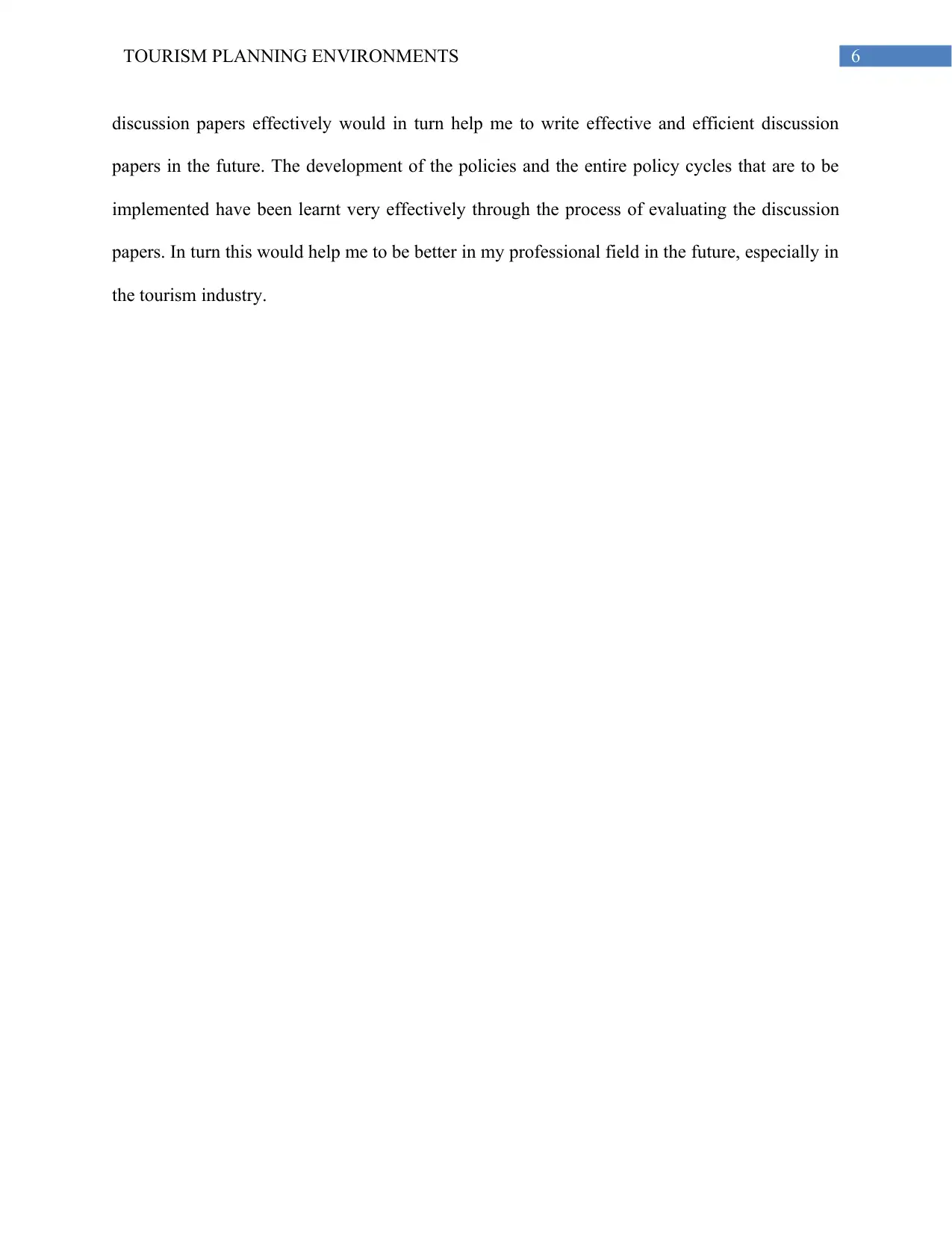
6TOURISM PLANNING ENVIRONMENTS
discussion papers effectively would in turn help me to write effective and efficient discussion
papers in the future. The development of the policies and the entire policy cycles that are to be
implemented have been learnt very effectively through the process of evaluating the discussion
papers. In turn this would help me to be better in my professional field in the future, especially in
the tourism industry.
discussion papers effectively would in turn help me to write effective and efficient discussion
papers in the future. The development of the policies and the entire policy cycles that are to be
implemented have been learnt very effectively through the process of evaluating the discussion
papers. In turn this would help me to be better in my professional field in the future, especially in
the tourism industry.
Paraphrase This Document
Need a fresh take? Get an instant paraphrase of this document with our AI Paraphraser
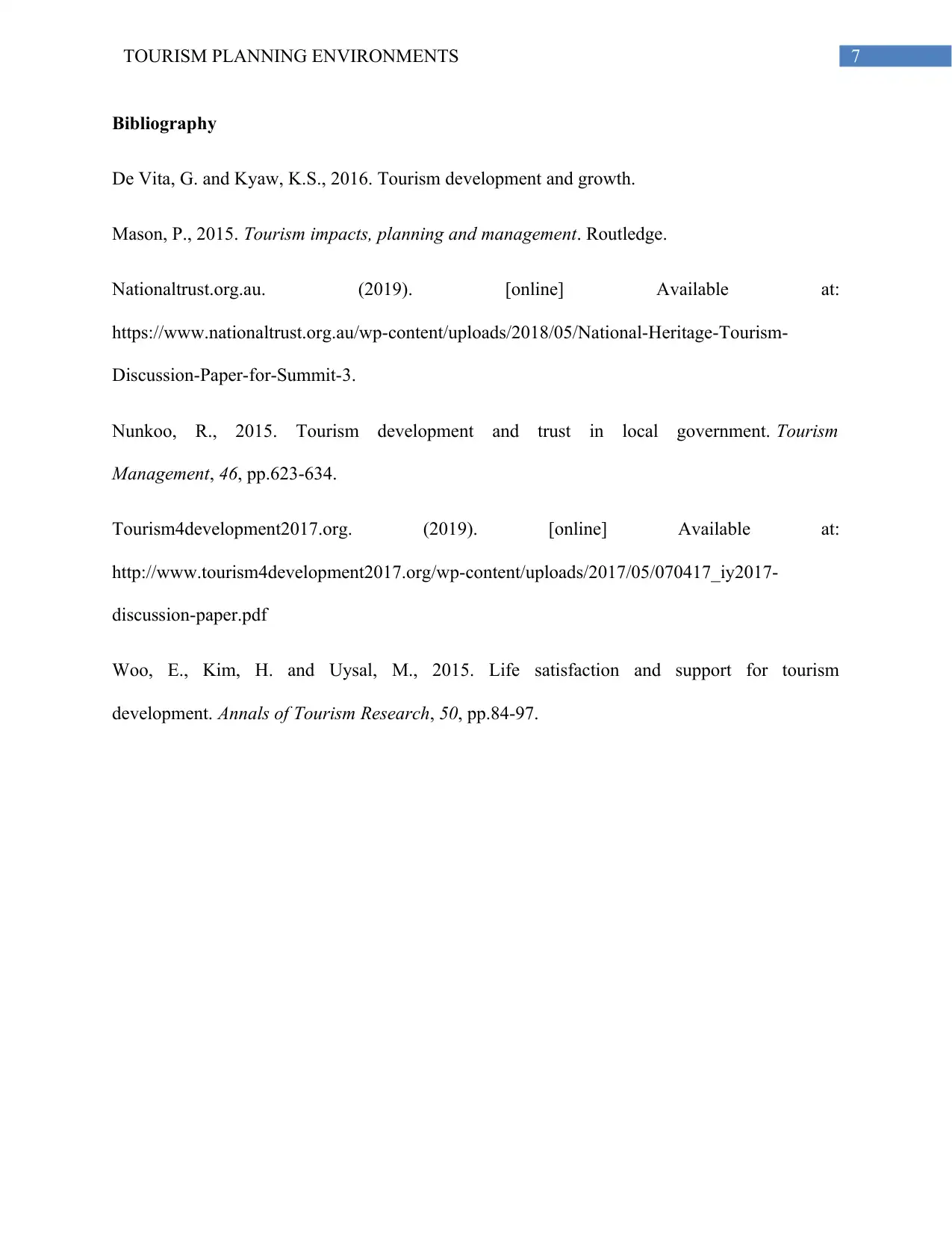
7TOURISM PLANNING ENVIRONMENTS
Bibliography
De Vita, G. and Kyaw, K.S., 2016. Tourism development and growth.
Mason, P., 2015. Tourism impacts, planning and management. Routledge.
Nationaltrust.org.au. (2019). [online] Available at:
https://www.nationaltrust.org.au/wp-content/uploads/2018/05/National-Heritage-Tourism-
Discussion-Paper-for-Summit-3.
Nunkoo, R., 2015. Tourism development and trust in local government. Tourism
Management, 46, pp.623-634.
Tourism4development2017.org. (2019). [online] Available at:
http://www.tourism4development2017.org/wp-content/uploads/2017/05/070417_iy2017-
discussion-paper.pdf
Woo, E., Kim, H. and Uysal, M., 2015. Life satisfaction and support for tourism
development. Annals of Tourism Research, 50, pp.84-97.
Bibliography
De Vita, G. and Kyaw, K.S., 2016. Tourism development and growth.
Mason, P., 2015. Tourism impacts, planning and management. Routledge.
Nationaltrust.org.au. (2019). [online] Available at:
https://www.nationaltrust.org.au/wp-content/uploads/2018/05/National-Heritage-Tourism-
Discussion-Paper-for-Summit-3.
Nunkoo, R., 2015. Tourism development and trust in local government. Tourism
Management, 46, pp.623-634.
Tourism4development2017.org. (2019). [online] Available at:
http://www.tourism4development2017.org/wp-content/uploads/2017/05/070417_iy2017-
discussion-paper.pdf
Woo, E., Kim, H. and Uysal, M., 2015. Life satisfaction and support for tourism
development. Annals of Tourism Research, 50, pp.84-97.
1 out of 8
Related Documents
Your All-in-One AI-Powered Toolkit for Academic Success.
+13062052269
info@desklib.com
Available 24*7 on WhatsApp / Email
![[object Object]](/_next/static/media/star-bottom.7253800d.svg)
Unlock your academic potential
© 2024 | Zucol Services PVT LTD | All rights reserved.



